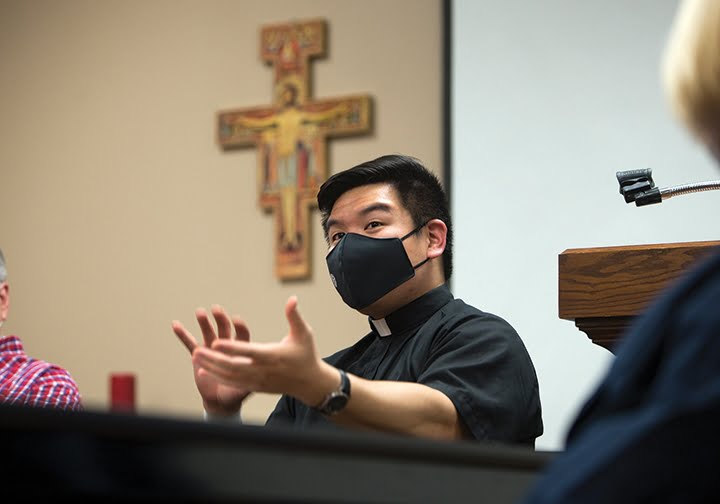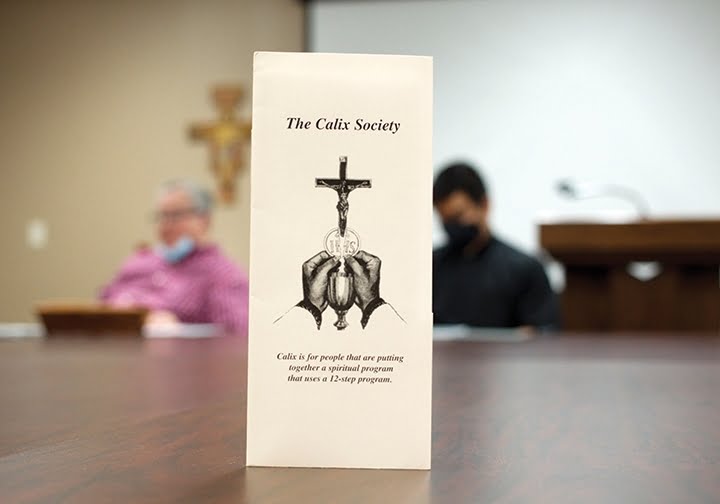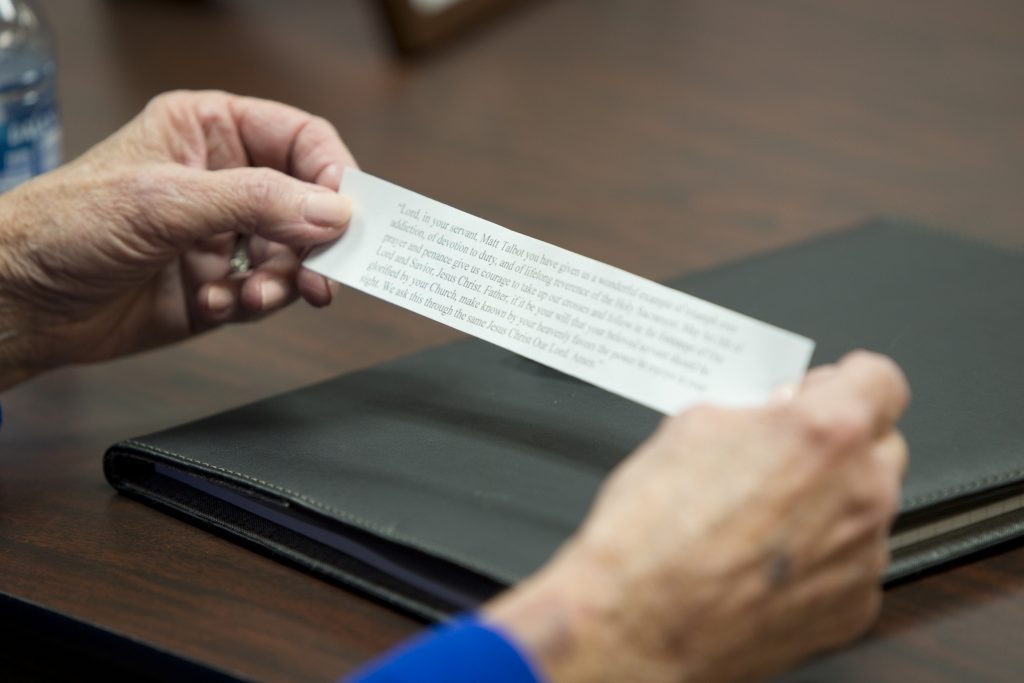
by Susan Fotovich McCabe
Special to The Leaven
For anyone battling an addiction of any kind, one of the first steps on the road to recovery is surrendering to a higher power.
As Catholics, we recognize that God is that higher power, and that having him alongside us in that journey gives us strength. That’s the simple concept behind the Calix Society, a national addiction support group with a local chapter in the Archdiocese of Kansas City in Kansas.
The Calix Society is not a “Catholic AA,” according to its website. It fully embraces the principles of authentic 12-step addiction programs, but offers enhanced support through an emphasis on the Catholic faith to bolster recovery.
“The Calix Society is an organization of Catholics who are maintaining their sobriety through active participation in an organized 12-step program,” said Neil, president of the Calix Society of Shawnee Mission. “In working our program, we noted how much commonality there is between the steps and the exercise of our Catholic faith.”
“In Calix,” he continued, “we are able to share the catholicity of our 12-step programs with one another. Working the steps in the context of the fullness and richness of our Catholic tradition is like putting the steps on steroids.”
The group meets once a month at Church of the Ascension in Overland Park. Neil and his wife Mary founded the archdiocesan chapter in 2018. Father Viet Nguyen, Ascension’s associate pastor, serves as the chapter’s chaplain.
It’s personal
For Neil and Mary, the group is especially important. Neil joined an organized 12-step program that meets at Ascension. Mary started an organized 12-step-based support group at the parish for people who love or live with a person who is battling an alcohol addiction.
“Addiction didn’t hit close to home, but in our home when I realized I was addicted to alcohol,” Neil said. “The good news is that I found my way into a 12-step program and Mary found her way into a support group. Through those programs and Calix, we each found that we could change our behavior by letting God change us.”
Even before the pandemic, addiction was a significant problem in the United States. According to the National Survey on Drug Use and Health (NSDUH), 19.7 million American adults (age 12 and older) battled a substance use disorder in 2017.
Almost 74% of adults suffering from a substance use disorder in 2017 struggled with an alcohol use disorder. Some professionals believe the pandemic has strained recovery for many individuals.

Archdiocesan husband and wife psychologists Deacon Mike Moffitt and Jacque Pfeifer have long counseled individuals with addictions. They founded the archdiocesan-sponsored, integrated wellness program Fully Alive, which focuses on mind, body and spirit programming. Their next Fully Alive session will focus on addiction and spotlight the Calix Society.
“Whether the addictive behavior relates to alcohol, drugs, gambling, pornography, sex, excessive eating or other types of addiction, Calix includes everyone, even those who are friends and family members of addicted individuals,” Pfeifer said. “Calix is for any person that is afflicted or affected by addictions. And although Calix draws from Catholicism, a member need not be Catholic.”
Catholic fellowship
Working from home, financial uncertainty and isolation are contributing to the stress of maintaining one’s sobriety, Deacon Moffitt said. Traditional 12-step programs are essential for addiction recovery. However, acknowledging God’s strength supplements that recovery.
“With Calix, you can talk about God and your Catholic faith, the sacraments and saints,” he said. “Sometimes, addiction causes us to lose our moral compass. Calix focuses on God to help lead us to prayer and recovery.”
That component of Calix is what appealed to Church of the Ascension parishioner Susan, who regularly attends Calix and an organized 12-step program as part of her recovery for an alcohol addiction.
A little over four years ago, Susan said she was given the “gift of desperation,” which led her to a 12-step program. It’s there she saw others who were “happy, joyful and calm,” and that’s what she wanted for herself. That’s where she met Neil as well, which eventually led her to add Calix to her recovery journey.
“I started to follow the steps and it changed my life. With the 12-step program, we can talk about our higher power, but not our faith,” Susan said. “My faith and Jesus are a big part of my life, but I’m not really allowed to go there in the 12-step program.
“Adding Calix to my support,” she continued, “allowed me to share Mass and meals and talk with other Catholics. It was a huge gift to me. I was so grateful that Neil started this group. “

Susan said the purpose of Calix is not to share one’s specific 12 steps, but instead explore how participants’ common 12 steps can help navigate one’s personal struggles through the “lens of the Catholic faith.” Being able to talk and share with other Catholics helps Susan live in what she calls a “disjointed world,” while offering her the support, prayers and perspectives of other Catholics.
Eliminating the stigma
According to Tom Racunas, lead consultant for the archdiocesan special- needs ministry, the purpose of the ministry is to facilitate “opportunities for a relationship with Christ by ensuring the fullest participation possible in the Catholic faith for all parishioners, regardless of ability.”
For some, ability is diminished by mental illness or addiction. The stigma attached to mental illness and/or addiction forces many to hide the severity of their symptoms or those of a loved one. Many stop coming to church due to the stigma.
“Stigma is the single greatest barrier to people getting effective treatment,” Racunas said. “Effective treatment includes integrating the mind, the body and the spirit. When this is done within a community of support, especially one that actively and authentically demonstrates God’s love and mercy, the better the outcome.”
“The goal of Fully Alive and Calix,” he continued, “is to bring as many as possible of the Catholic resources and programs available throughout the archdiocese into one avenue for access by the faithful so they may learn, grow and heal in mind, body and spirit.”
Racunas said it is appropriate that Catholics who are in recovery from addiction have access to a Catholic program that supports their recovery efforts.
Spreading awareness
While the meeting is held at Church of the Ascension, anyone is welcome. Other parishes are spreading the word, including St. Michael the Archangel pastoral ministry coordinator Mary Connor. She is always looking for programs and resources to support St. Michael parishioners.
“Addiction touches the lives of many people — perhaps even the ‘perfect family’ you see sitting in front of you at Mass,” Connor said. “I love the Scripture verse, 1 Corinthians 12: 26, which essentially says that when one member of our body is struggling with addiction, we all suffer. When one person is celebrating recovery, we all share in the joy of recovery.”
Walking with God
Father Nguyen leads the monthly group with a Mass at 7 p.m. The meeting begins at 8 p.m. Before COVID-19, there was time for a meal and fellowship. Father Nguyen, who has ministered to people battling addiction over the years, believes Calix is the perfect pairing to an organized 12-step program.
“I’ve heard from people who have joined 12-step programs, that their addiction, their common struggle, is what brings people together,” Father Nguyen said. “In Calix, their faith in Jesus Christ is what brings people together. People have a yearning to move past their own sins and to grow in their faith. It’s no longer the commonality in the struggle, but struggling for holiness.”
According to Neil, Calix participants must be in a period of recovery and engaged in regular meetings with a 12-step program. They must also have an open heart and let Jesus in their lives.
“Many times, I asked God for a miracle, that he would take my addiction away or at least let me find the strength to control it,” said Neil. “I wondered why he never answered my prayers.”
“What I didn’t understand was that God was very willing to perform the miracle, but I had a part to play in that miracle and I wasn’t doing my part,” he continued. “I spent eight years being taught by the Jesuits in high school and college, but didn’t learn how to turn my will and my life over to God.
“I thank God for my alcoholism, because God was able to use it to bring me closer to him.”
For additional information on the local Calix Society chapter, call Mary at (913) 747-5039 or Neil at (913) 645-7244.






